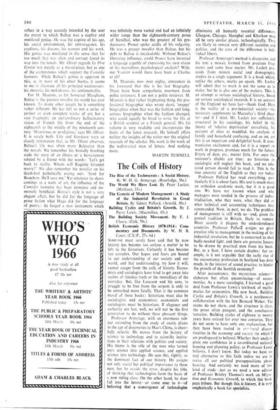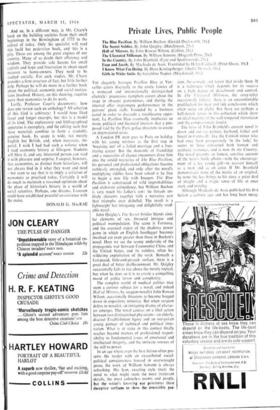The Coils of History
The Rise of the Technocrats : A Social History.
(Methuen, 35s.) The Genesis of Modern Management : A Study of the Industrial Revolution in Great Britain. By Sidney Pollard. (Arnold, 50s.) British Economic History 1870-1914: Com- mentary and Documents. By W. H. B. Court. (C.U.P., 27s. 6d.) SOMEONE must surely have said that by now history has become too serious a matter to be left to the historians. Certainly it has become too complex. Our hopes and fears are bound to our understanding of our society and our world, and that understanding, try how it will, cannot escape from the coils of history. Econo- mists and sociologists have tried to get away into realms of timeless truth or the immediacy of the everyday. But, like Laocoon and his sons, to struggle to be free from the serpent is only to be enmeshed more fatally. That is the common moral of these books: historians must also be sociologists and economists; economists and sociologists must be historians. If elegance and authority are lost, well, we will not be the first generation to do without these pleasant things. Professor Armytage, with an enormous sub- ject extending from the study of exotic plants
in the age of discoveries to Mao's China, is cheer- fully eclectic. He moves from the history of science to technology and to scientific institu- tions in their relations with politics and society. His theme is the role of the men who turned pure science into applied science, and applied science into technology. He sees this, rightly, as the dominant fact of our history. He assign not only social but political importance to these men, but he avoids the error, despite his title, of thinking that technologists form the basis of a new ruling class. On the other hand, he does fall into the heresy—or come near to it—of believing that a .convergence of technologies
eliminates all humanly essential differences. Glasgow, Chicago, Shanghai and Kharkov may all be very similar places, technologically. They are likely to remain very different societies and polities, and the core of the difference is indi- vidual liberty.
Professor Armytage's method is discursive, and his text a mosaic formed from precious frag- ments and some base matter. Mr. Laslett pro- ceeds from minute social and demographic studies to a single argument. It is a book which, unlike the others, marks an epoch. Mr. Laslett will admit that to mark is not the same as to make; but he is also one of the makers. This is an attempt at serious sociological history, based on serious sociological research. It is an account of the England we have lost—thank God. Here is the reality of a pre-industrial society—the necessary supplement to Macaulay's third chap- ter—and if I think Mr. Laslett not sufficiently structural in his sociology, his belief in the theory of 'relative deprivation' unrealistic, his account of class as muddled, his analysis of family and household confusing, and so on, yet this is an important and delightful book. It com- municates excitement and, for it is a report on work in progress, promises much for the future. Errors of date, etc., matter little. For once the reviewer's cliches are true: no historian or sociologist will neglect this book, and no edu- cated person should fail to read it. This is the true ancestry of the English as they are today.
Professor Pollard has read everything, par- ticularly if it is about facts. His text is much more an orthodox academic work, but it is a good one. We have not known when and why managers were needed in the process of indus- trialisation, who they were, what they did or what technical and accounting techniques they commanded. Now, in part, we do. The problem of management is still with us—and, given the genteel tradition in Britain, likely to remain. More acutely it plagues the underdeveloped countries. Professor Pollara assigns no great
creative rale to management in the making of the industrial revolution, but he is concerned to shed
badly-needed light, and there are genuine lessons to be drawn by practical men from his book. But, as a Scot, I have certain doubts: for ex- ample, is it not arguable that the early rise of the accountancy profession in Scotland has done much, in the interest of sound practice, to hinder the growth of the Scottish economy?
After accountancy, the mysterious science— elaborate but often unconvincing—of econo- metrics. As a mere sociologist, I learned a good deal from Professor Lewis's textbook of mathe- matics for economists. His new book, Building Cycles and Britain's Growth, is a posthumous collaboration with the late Bernard Weber. The seams do not show, and the structure is clear, the prose often pungent, and the conclusions tentative. Building cycles of eighteen to twenty years have existed for over two centuries. They do not seem to have only one explanation, but
they have been rooted in sti 1..7tural discon- tinuities in the economy and society (in which I
am predisposed to believe). Whether their analysis gives one confidence in a co-ordinated national housing and planning policy, as Professor Lewis believes, I don't know. But today we have no real alternative to this faith unless we are to revise all our political presuppositions about housing. And certainly we need more of this kind of study—just as we need a new edition of Professor Brinley Thomas's work on Migra. tion and Economic Growth, to which this book pays tribute. But though this is history, it is verY emphatically a book for specialists.
And so, in a different way, is Mr. Cleary's book on the building societies from their small beginnings in the Birmingham of 1775 to the colossi of today. Only the specialist will read this lucid but pedestrian book, and this is a pity. These are among the great engines of our country. Many of us doubt their efficiency and wisdom. They provide safe havens for small capitals and hope and frustration in about equal measure to home-owners. They need to be studied socially. For such studies, Mr. Cleary provides a firm structure of fact, but little further help. Perhaps he will do more in a further book about the political, economic and social motiva- tions involved. History, on this showing, requires more than economics to do its work.
Lastly, Professor Court's documents: how does one review such an anthology? All selection of this kind is arbitrary: I would have liked fewer and longer excerpts, but this is a model of its kind. The explanatory and bibliographical apparatus is exemplary, and the editing such that these materials combine to form a readable, genuine book. Its scope is wide, not merely English but British, and, when necessary, im- perial. I wish I had had such a volume when I read economic history at Glasgow. Students will bless it, and any interested person can read it with pleasure and surprise. I suspect, however, that economists, as distinct from historians, will not always find in it what they want and need —but even to say that is to imply a criticism of economics as practised today. Certainly it will do much to maintain a reasoned optimism about the place of historian's history in a world of social scientists. Perhaps, one dreams, Laocoon could have established peaceful co-existence with the snake.
DONALD G. MAcRAE







































 Previous page
Previous page